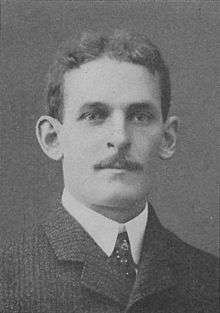Joseph Wentworth
Joseph "Little Joe" Wentworth (January 29, 1877 – April 7, 1944) was an American football player, coach, and lawyer.
 | |
| Biographical details | |
|---|---|
| Born | January 29, 1877 Sandwich, New Hampshire |
| Died | April 7, 1944 (aged 67) Boston, Massachusetts |
| Alma mater | Dartmouth Harvard Law School |
| Playing career | |
| Football | |
| 1896–1899 | Dartmouth |
| Baseball | |
| 1899-1900 | Dartmouth |
| Position(s) | Quarterback |
| Coaching career (HC unless noted) | |
| Football | |
| 1900–1901 | Kenyon |
| 1902–1906 | Case |
| Head coaching record | |
| Overall | 46–15–3 |
| Accomplishments and honors | |
| Championships | |
| 4 OAC (1902–1905) | |
Wentworth was born January 29, 1877 in Sandwich, New Hampshire to Paul and Ellen Tilton (Dunklee) Wentworth. Wentworth attended the Holderness School from 1890 to 1896 and Phillips Academy Andover from 1893 to 1896. For his undergraduate career, he attended Dartmouth College, graduating in 1900. He was a member of the Sphinx, a Dartmouth secret society, and Alpha Delta Phi fraternity. Wentworth graduated from Harvard Law School in 1903, and spent most of his professional career with the law firm Choate, Hall & Stewart in Boston.
Playing career
As a collegiate athlete, he played football at Dartmouth as a quarterback. He captained the freshmen team in 1896 and played varsity from 1897–1899. Wentworth captained the varsity team his final season in 1899.[1] He was a member of the varsity baseball team during his junior and senior years playing centerfield.[2][3]
Coaching career
Wentworth began his career coaching for Kenyon from 1900 to 1901.[4]
When hired in 1902 by Case School of Applied Science in Cleveland, Coach Wentworth was the highest paid football coach in the nation at $3,000.[5]
Upon its formation in 1902, Wentworth won the first four titles of the Ohio Athletic Conference with Case School of Applied Science. During this four year stretch, he achieved a dominating league record of 18–1–1, including beating archrival Western Reserve by a combined 132–0.[6]
In 1906, college football's rules changed allowing for the forward pass. After coaching one season under the new rules, Coach Wentworth decided to resign, saying he would go back to Boston and practice law rather than learn football all over again.[7]
Professional career and later years
After graduating Harvard Law School, Wentworth became a member of the Massachusetts bar in 1903 and was associated with the firm Choate, Hall & Stewart of Boston, before officially becoming a member of the firm in 1909.[8]
Head coaching record
| Year | Team | Overall | Conference | Standing | Bowl/playoffs | ||||
|---|---|---|---|---|---|---|---|---|---|
| Kenyon Lords (Independent) (1900–1901) | |||||||||
| 1900 | Kenyon | 6–1–1 | |||||||
| 1901 | Kenyon | 7–2 | |||||||
| Kenyon: | 13–3–1 | ||||||||
| Case (Ohio Athletic Conference) (1902–1906) | |||||||||
| 1902 | Case | 6–3 | 5–0 | 1st | |||||
| 1903 | Case | 8–1 | 5–0 | 1st | |||||
| 1904 | Case | 7–2 | 4–1 | 1st | |||||
| 1905 | Case | 8–1–1 | 4–0–1 | 1st | |||||
| 1906 | Case | 4–5–1 | 2–3 | 4th | |||||
| Case: | 33–12–2 | 20–4–1 | |||||||
| Total: | 46–15–3 | ||||||||
References
- The Wearers of Green. October 20, 1989. p. 36. http://www.dartmouthsports.com/pdf9/2637230.pdf?DB_OEM_ID=11600
- "25th Annual Excursion of the Sandwich Historical Society".
- https://newspapers.case.edu/?a=d&d=CT19030930-01.2.11&srpos=3&e=-------en-20--1-byDA-txt-txIN-case+football+1901+captain------
- http://digital.kenyon.edu/cgi/viewcontent.cgi?article=2381&context=collegian
- Cramer, C. H. (1976). Case Western Reserve: A History of the University 1826-1976. The World Publishing Company. p. 172.
- http://athletics.case.edu/sports/spartan_club/bios/wentworth_joe
- Cramer, C. H. (1976). Case Western Reserve: A History of the University 1826-1976. The World Publishing Company. p. 371.
- https://play.google.com/books/reader?id=2NwhdOQ88wEC&printsec=frontcover&output=reader&hl=en&pg=GBS.PP1